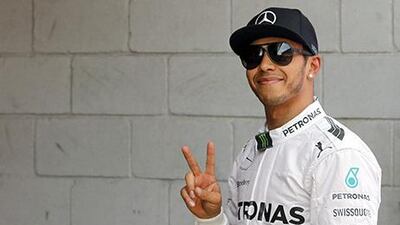Mercedes duel
It seems daft to put heavy emphasis on what is only the fifth round of a 19-race season but Nico Rosberg must win in Barcelona.
Mercedes-GP teammate Lewis Hamilton is on a roll, having won the past three races, and Rosberg must stop that momentum.
The Mercedes cars are in a class of their own at Circuit de la Cataluyna, as with everywhere else thus far, and it is becoming increasingly clear it will be either Hamilton or Rosberg who will win this championship.
Rosberg looked quicker for much of Saturday, topping the times in final practice and then the first two parts of qualifying but when it counted at the end it was Hamilton who put the fastest lap together to start on pole.
Rosberg is optimistic he has a good car set-up for the race, while Hamilton was more wary of the consistency of performance of his car.
But Rosberg must exploit that, if this turns out to be the case. He was faster in Bahrain, but did not win, and that was worrying.
If you triumph when you are not at your best, as Hamilton did in Sakhir at his teammate’s expense, that is the kind of thing that bodes well for championships to be won.
Rosberg is only four points clear in the standings because of Hamilton’s non-finish in Australia and he will lose that advantage if he is defeated by Hamilton again, so expect a tenacious performance from the German to try to prevent that.
Challenge for Vettel
Surprisingly for a man who has dominated Formula One so much in the past four years, Sebastian Vettel has never started the Spanish Grand Prix from pole position. That run was never going to be broken this weekend, given the speed of the Mercedes, but the world champion would have expected to have been on the second row had it not been for the gearbox problem that forced him to stop in the top-10 shoot-out in qualifying.
He lines up in 15th after Red Bull Racing needed to change his gearbox, causing a five-place grid penalty. The good news is the Red Bull car is the second fastest package in Barcelona so he should make up places in the race, though the difficulty of overtaking means a good strategy will be needed if he is to score good points.
The problem for the German is that teammate Daniel Ricciardo lines up third, and looks set to increase his run of good form and results over Vettel, having beaten him in the past two races in Bahrain and China.
Barring a problem for the Australian it is difficult to see Vettel getting near him, which will not improve his already grumpy mood.
Ferrari woe
On paper it was quite the coup for Kimi Raikkonen as he became the first man to out-qualify Fernando Alonso at the Spaniard’s home race in Barcelona since Jarno Trulli achieved the feat in 2004.
But in reality there was little for either Ferrari man to be cheery about, finishing sixth and seventh, but a resounding 1.9 seconds off pole-sitter Lewis Hamilton’s fastest time – a gigantic margin by modern F1 standards.
This was not what Alonso was dreaming of for his home race, and though you can be assured he will wring the maximum out of the Ferrari in the 66-lap race, fourth place looks his best hope, given the speed of the two Mercedes cars and Ricciardo.
But the qualifying deficit is the clearest sign yet of just how far off the pace Ferrari are, and right now, the chances of winning just one race in 2014, let alone challenging for the championship, looks remote for the Italian team.
Tight midfield
Excluding the two Mercedes cars, who are in a class of their own, qualifying was very competitive. Adrian Sutil, the Sauber driver, was 17th in the first part of qualifying and was the last driver eliminated from first qualifying.
But he was only six tenths off the third-quickest time in that session, set by Vettel, showing just how tight things were.
Expect a close duel for the final points positions, with Force India, McLaren, Lotus, Williams and Sauber all having genuine reasons for being optimistic of their chances of leaving Barcelona with their constructors’ championship standings having improved.
gcaygill@thenational.ae
Follow our sports coverage on Twitter @SprtNationalUAE

